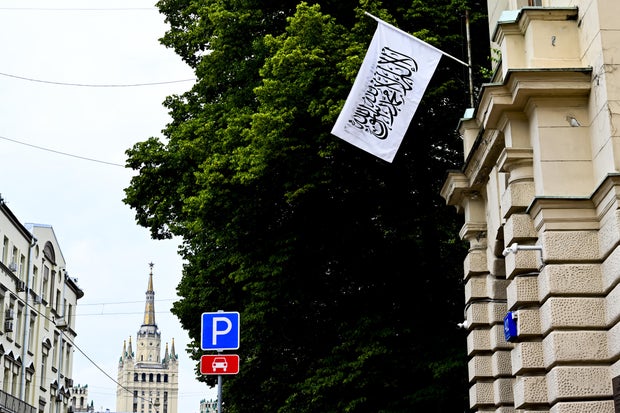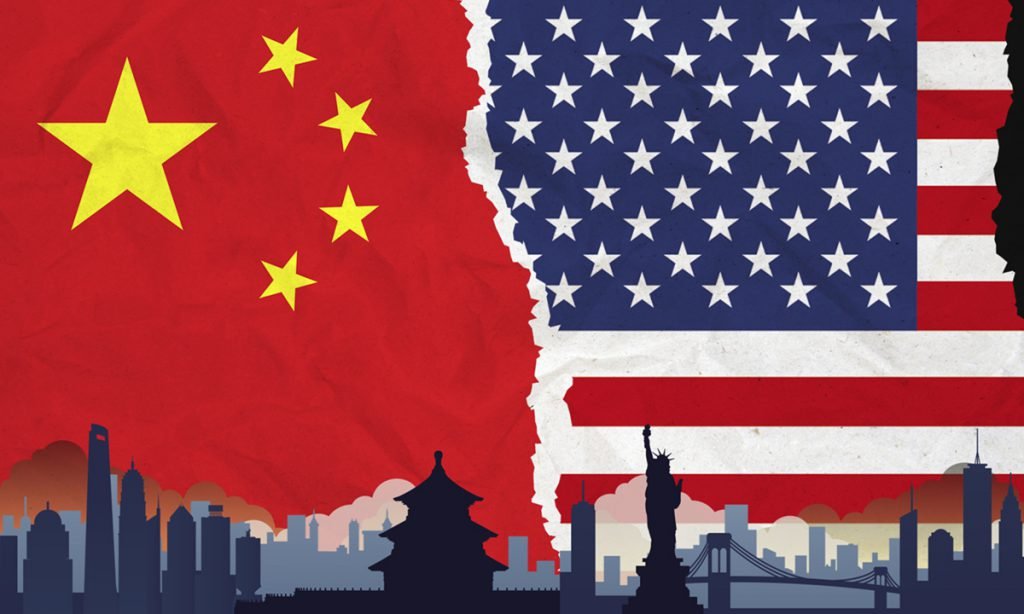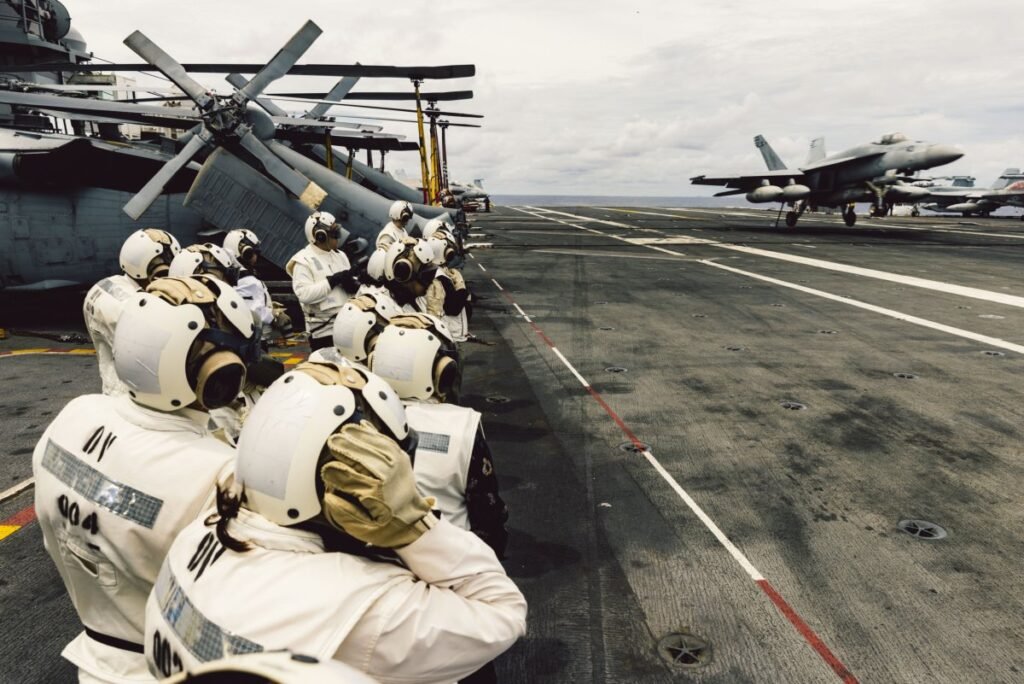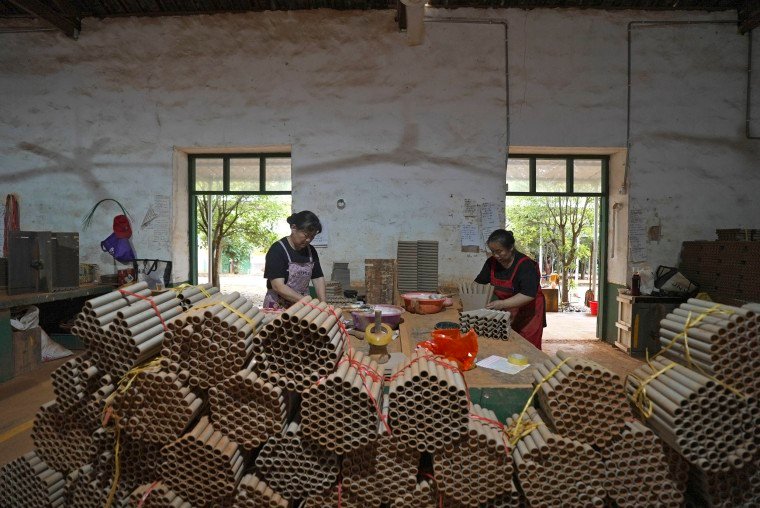Russia has become the first country to formally recognize the Taliban’s government in Afghanistan since it seized power in 2021 after Moscow removed the group from its list of outlawed organizations.
The Russian Foreign Ministry announced Thursday that it had received credentials from Afghanistan’s newly appointed Ambassador Gul Hassan Hassan. The official recognition of the Afghan government will foster “productive bilateral cooperation,” the ministry said in a statement.
Afghanistan’s Foreign Ministry called it a “historic step,” and quoted Taliban Foreign Minister Amir Khan Muttaqi as welcoming the decision as “a good example for other countries.”
The flag used by the Taliban’s interim government is seen over the building of Afghanistan’s Embassy after Russia has officially recognized the Taliban government in Afghanistan, in Moscow, Russia on July 04, 2025. Sefa Karacan/Anadolu via Getty Images 
“We believe Russia’s move is a positive message to the rest of the world. … We think some Muslim and regional countries may follow suit,” Taliban spokesperson Zabihullah Mujahid told CBS News.
China welcomed Russia’s decision Friday. “As a traditional friendly neighbor of Afghanistan, the Chinese side has always believed that Afghanistan should not be excluded from the international community,” foreign ministry spokesperson Mao Ning said.
“No matter how the internal or external situation changes in Afghanistan, diplomatic relations between China and Afghanistan have never been interrupted,” she said.
A former senior Taliban official told CBS News’ Sami Yousafzai on Friday that while the group’s leadership would no doubt welcome the Russian and Chinese backing, there was a recognition that “Russia and China can’t financially support us the way the Americans did.”
During two decades of U.S.-backed governance in Afghanistan, there was a steady flow of billions of dollars into the country, helping pay for everything from police salaries and hospitals to schools and weapons for the military and police. Since the Taliban retook power in the summer of 2021, that financial support from the U.S. and its allies has virtually dried up.
“Only America and its allies can bring real relief — if they choose to,” the former Taliban official told Yousafzai. “We know that.”
The Taliban took control of Afghanistan in August 2021 following the withdrawal of U.S. and NATO forces. Since then, they have sought international recognition while also enforcing their strict interpretation of Islamic law.
While no country had formally recognized the Taliban administration until now, the group had engaged in high-level talks with many nations and established some diplomatic ties with countries including China and the United Arab Emirates.
Still, the Taliban government has been relatively isolated on the world stage, largely over its restrictions on women.
Although the Taliban initially promised a more moderate rule than during their first stint in power from 1996 to 2001, it started to enforce restrictions on women and girls soon after the 2021 takeover. Women are barred from most jobs and public places, including parks, baths and gyms, while girls are banned from education beyond sixth grade.
Russian officials have recently been emphasizing the need to engage with the Taliban to help stabilize Afghanistan, and lifted a ban on the Taliban in April.
Russia’s ambassador to Afghanistan, Dmitry Zhirnov, said in remarks broadcast by state Channel One television that the decision to officially recognize the Taliban government was made by President Vladimir Putin on advice from Foreign Minister Sergey Lavrov.
Zhirnov said the decision proves Russia’s “sincere striving for the development of full-fledged relations with Afghanistan.”
On Friday, the Taliban took down the tricolor flag of the republic from the embassy building in Moscow and replaced it with their white flag, prompting reactions from former republic officials.
“An authoritarian regime recognizing another”
“Russia’s recognition of the Taliban marks a turning point. It legitimizes a regime that bans girls from education, enforces public floggings, and shelters UN-sanctioned terrorists,” Mariam Solaimankhail, a former member of the Afghanistan parliament during the republic government, wrote on social media. “The move signals that strategic interests will always outweigh human rights and international law.”
Naseer A. Faiq, the chargé d’affaires of the Afghan Permanent Mission to the United Nations, said, “The recognition of the Taliban by countries that have supported them over the past twenty years is not surprising. But the main question is whether this recognition will have an impact on the political, economic, social, and humanitarian situation in Afghanistan and its people, who are facing poverty, unemployment, and uncertainty, or not?
“The answer is clear: this political move is apparently in the interests of the Taliban, but its long-term negative effects on the Afghan people will be much greater.”
Torek Farhadi, a veteran geopolitical analyst, believes Russia is interested in rare earth minerals in Afghanistan. He said Moscow’s recognition of the Taliban makes financial investment possible for Russia’s defense industry in the region.
“Afghanistan has rare earth mines and deposits and Moscow has the mappings from the Soviet day,” Farhadi told CBS News. “Moscow officially recognizes the Taliban, it opens the door for investments as rare earth becomes key to the auto industry and the defense industry. Moscow is interested in this spot before anybody else returns to Afghanistan for such investments.”
Mohammad Halim Fidai, a former provincial governor and civil society activist in exile in Germany, told CBS News, “By endorsing the Taliban regime, Russia has not only violated international norms but also undermined the global consensus against recognizing a government with a deeply troubling human rights record.”
“This move risks further marginalizing both Russia and the Taliban on the world stage.”
“Moreover, it exposes the flawed assumptions by some in the West that the Taliban had reformed and would respect basic rights. Ultimately, this endorsement reflects a broader trend of authoritarian solidarity — an authoritarian regime recognizing another.”






